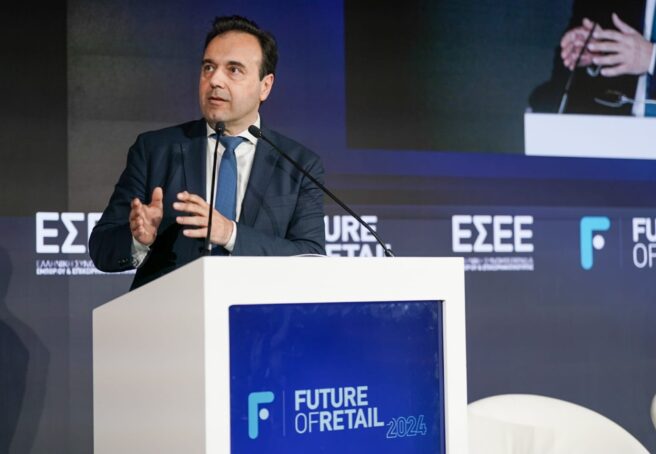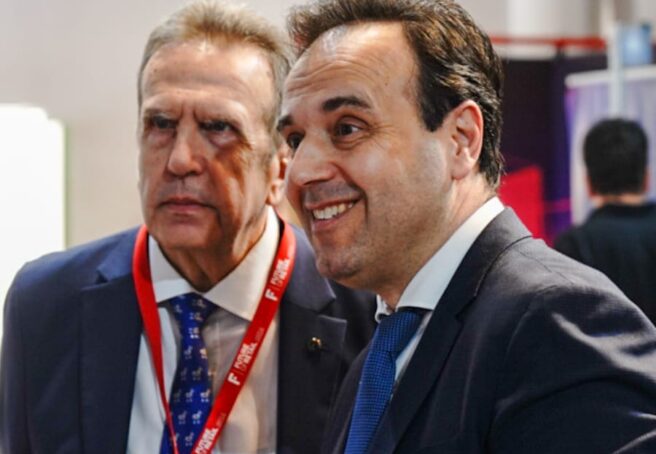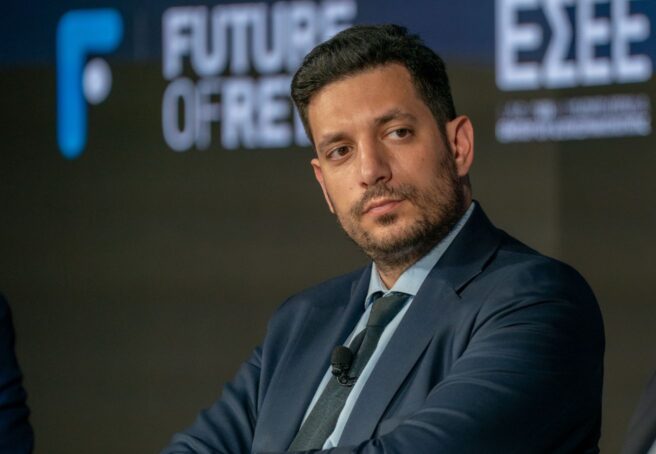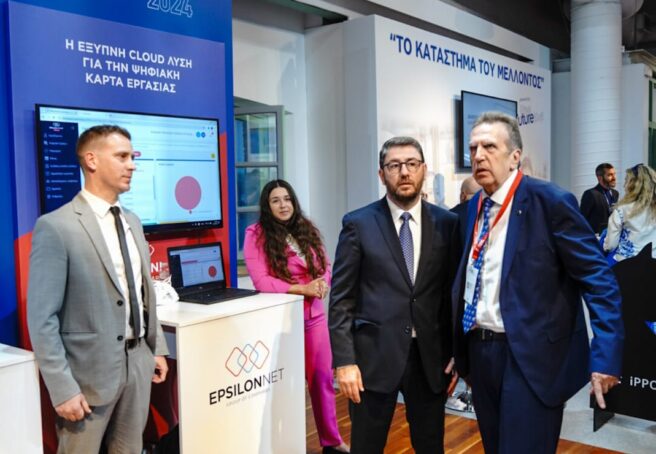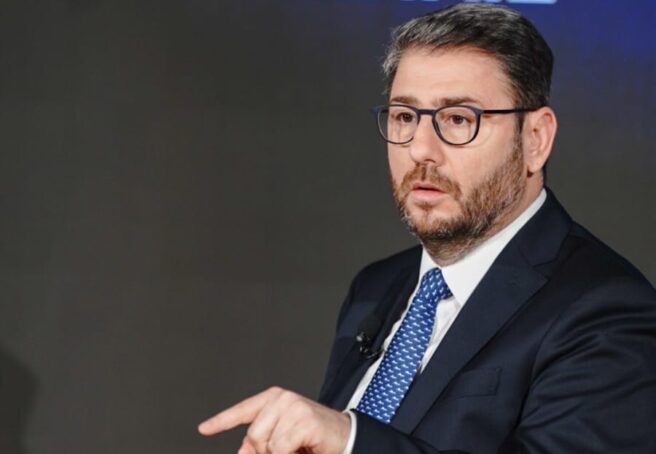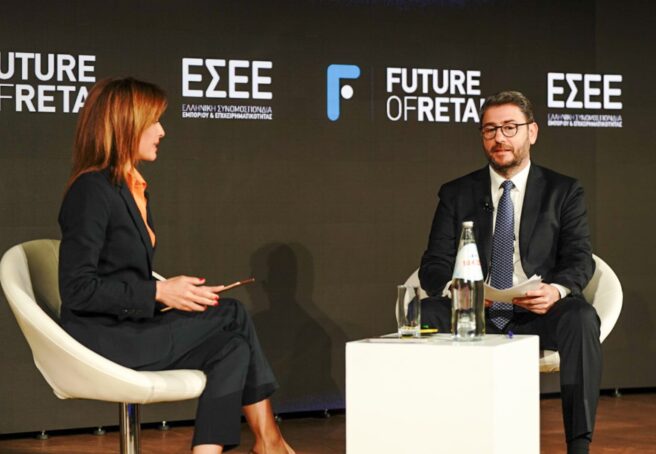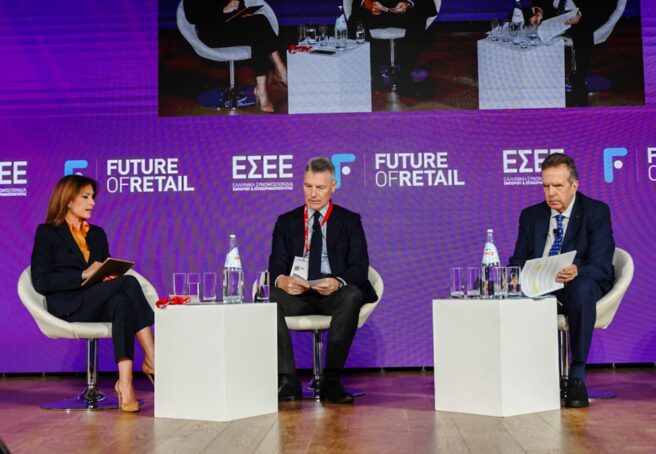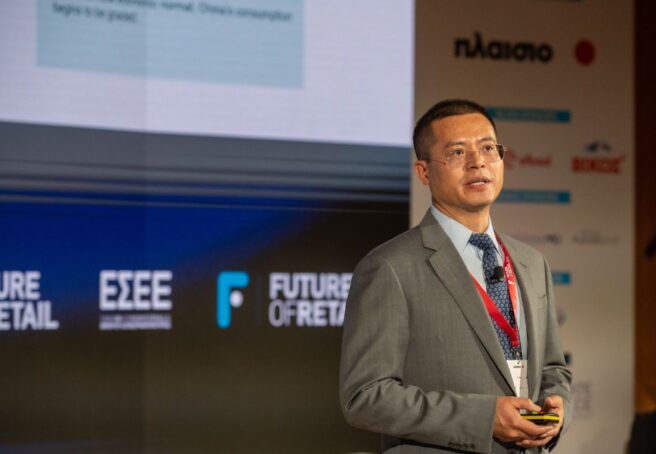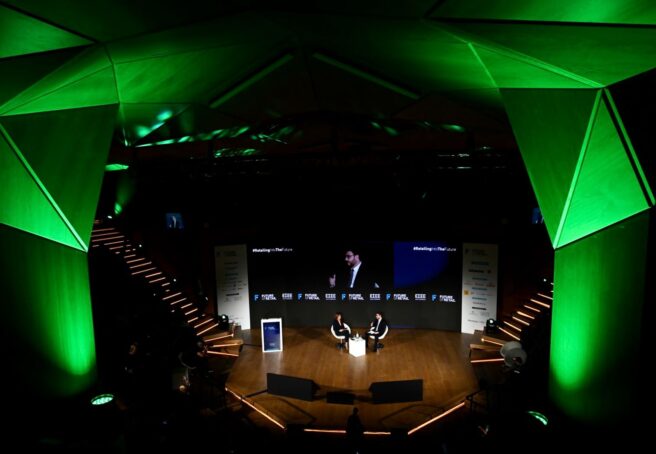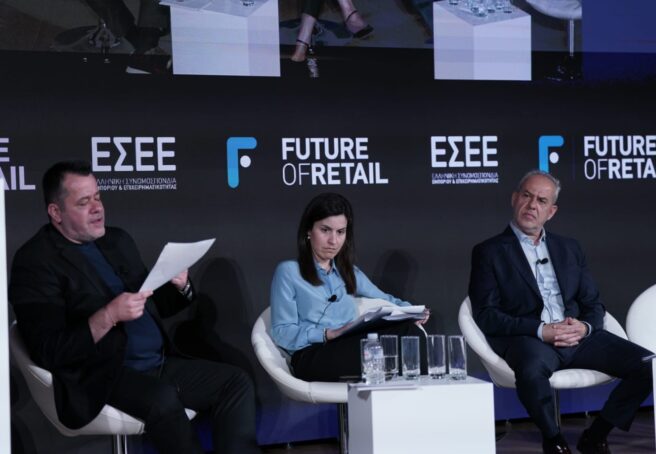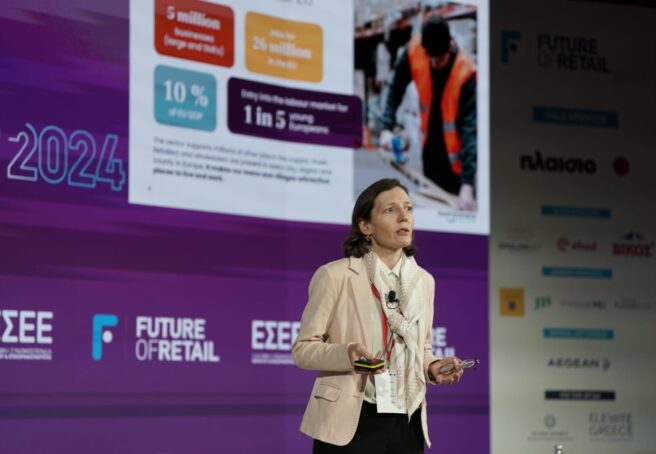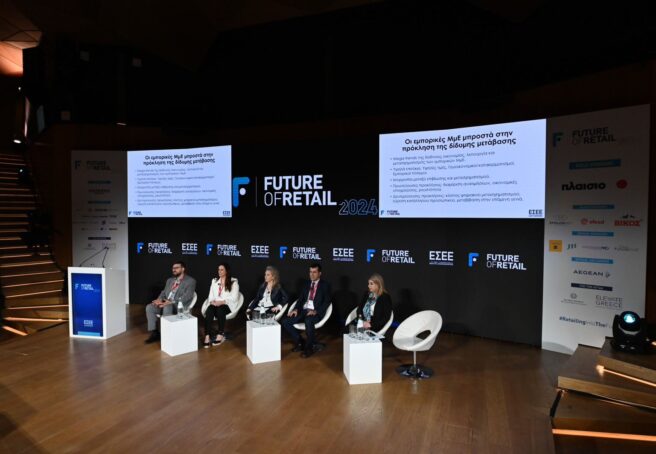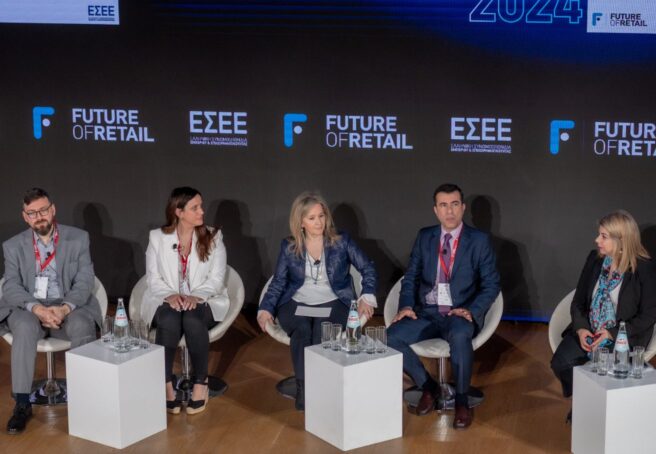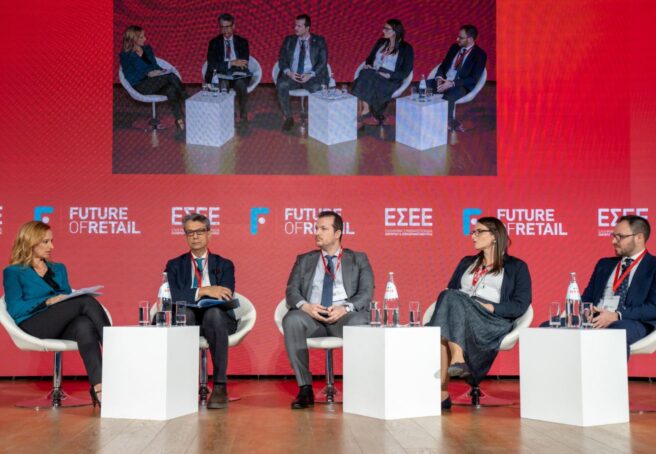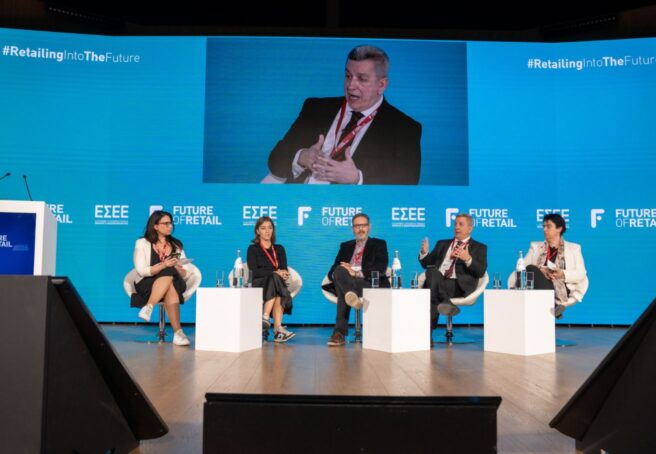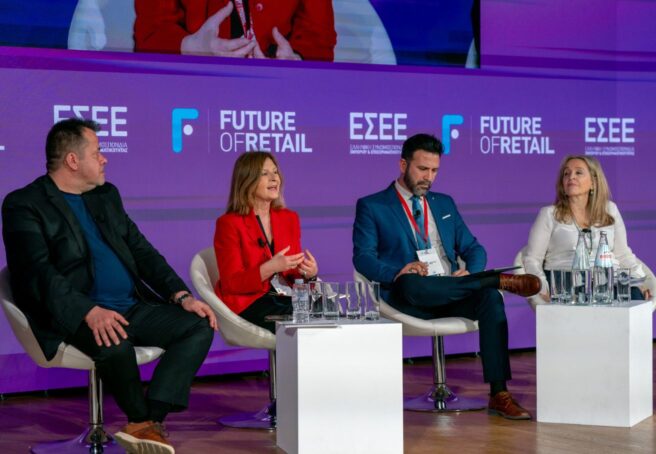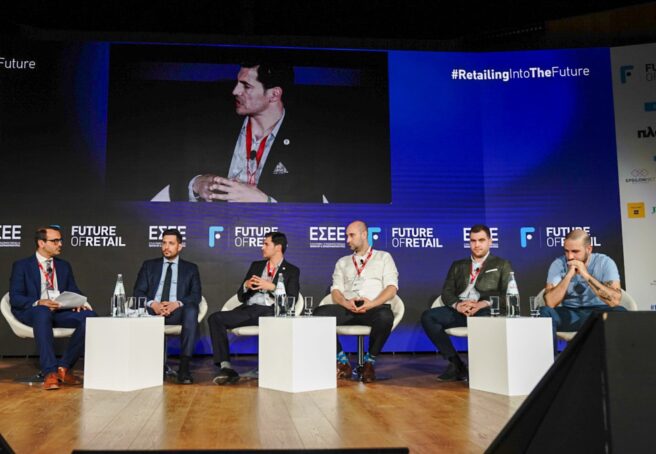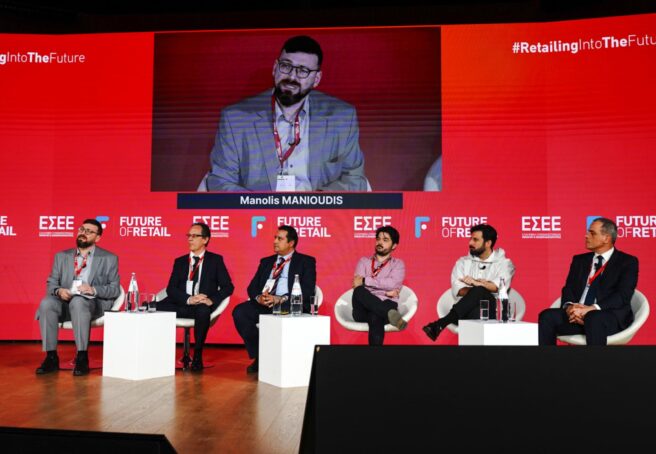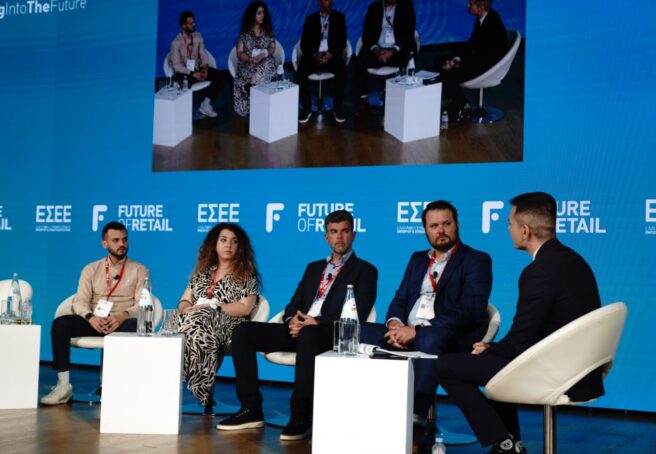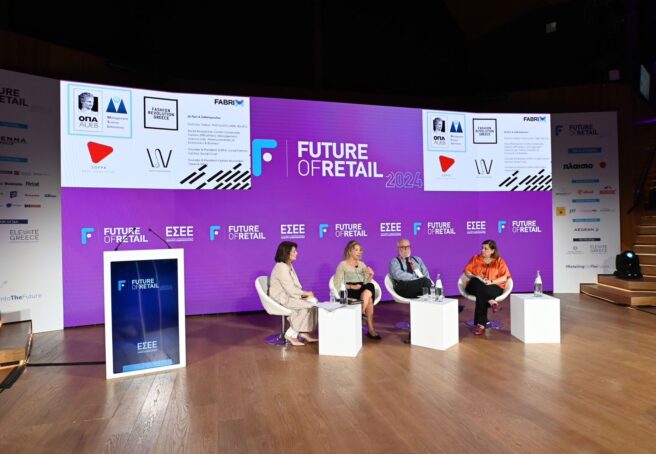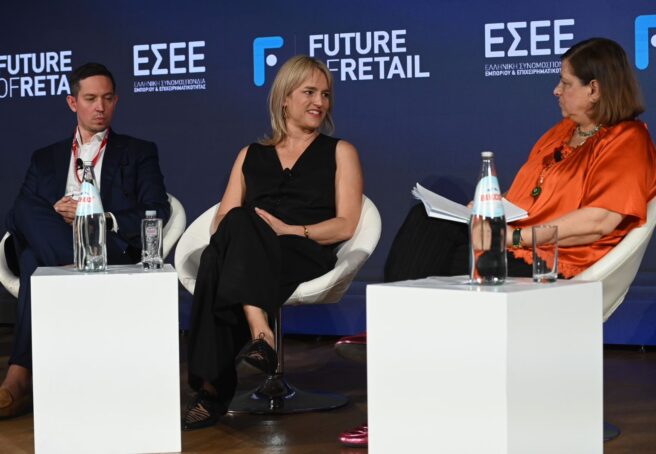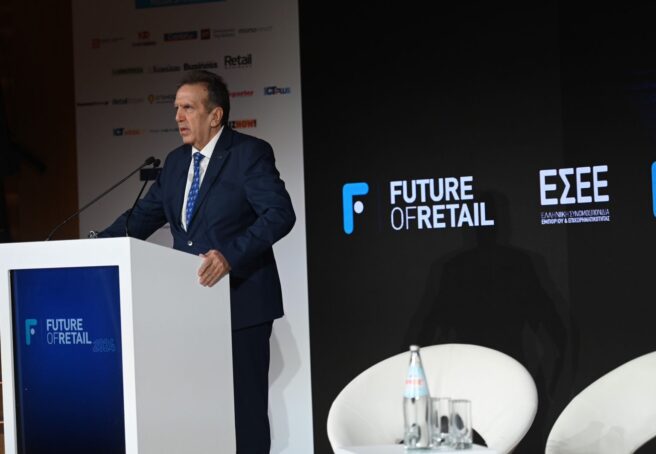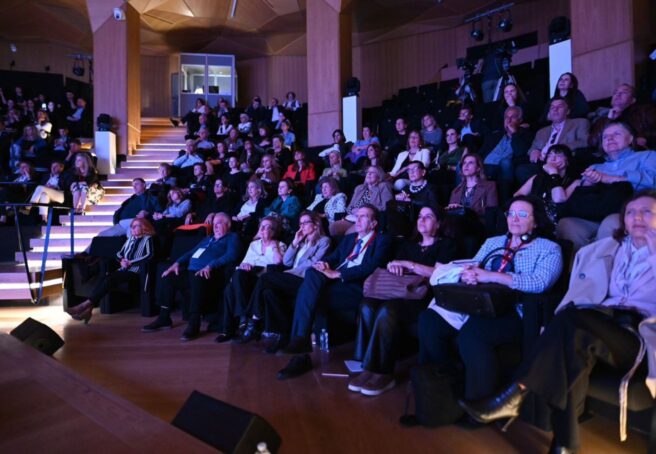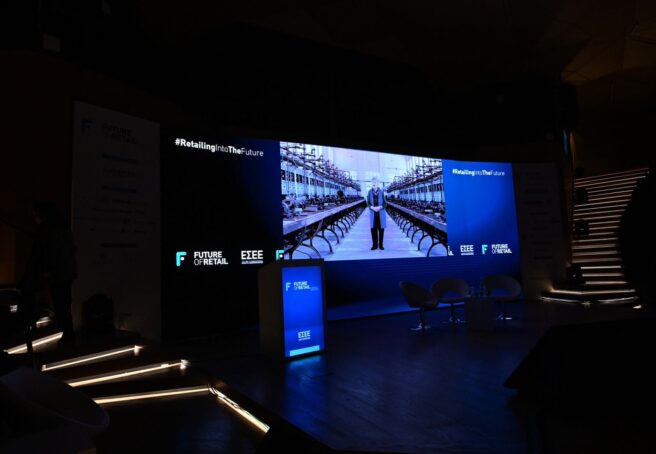Technology, industry synergies, sustainability and new skills are co-shaping the future of Retail
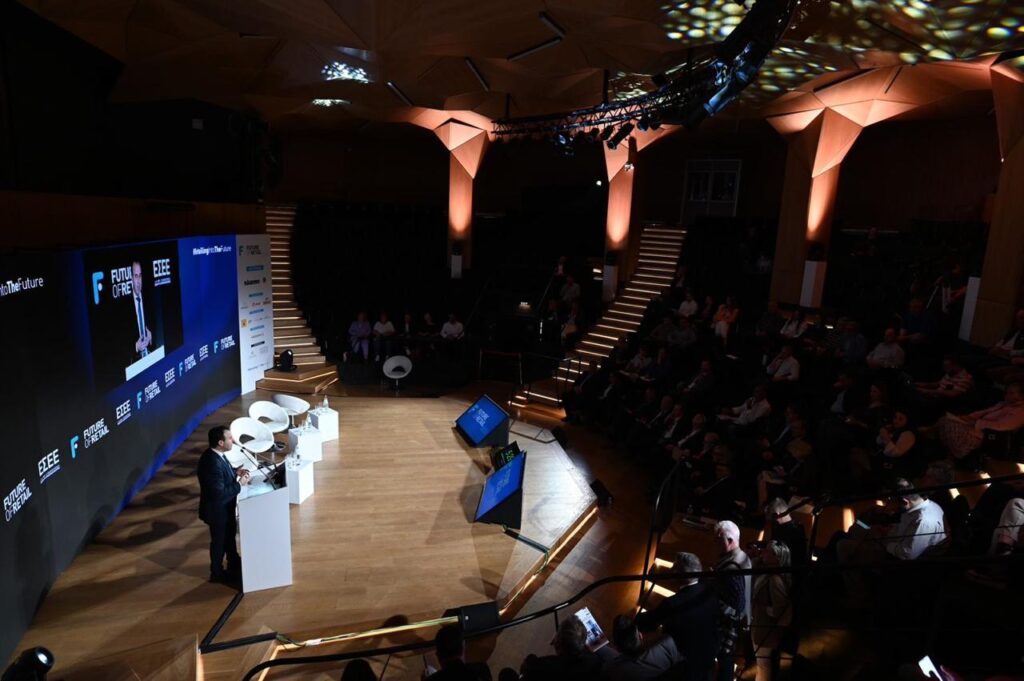
Creative reflection and innovative solutions to the cutting-edge issues of Retail Commerce on the 1st day of the ESEE International Conference
G. Karanikas: “We are informed about the best international practices in the face of the challenges of digital and green transformation”.
D. Papastergiou: “We are becoming part of a new digital reality for the state and business”.
N. Androulakis: “Accuracy undermines the people’s everyday life and shows that the economy is not durable”.
C. Delberghe (Eurocommerce): “The war, inflation, and the formation of different consumer patterns are the sector’s biggest challenges.”
The “on the move” and in fact double – -digital and green – a transformation of Retail Commerce was put on the carpet in the rich “menu” of the 1st day of the Future of Retail 2024. The full story of the future of commercial enterprises unfolded in parallel events that received country in three different buildings of the Technopolis of the Municipality of Athens. The alternation between the speeches of the leading speakers and presenters on the main stage of the Miltiadis Evert Amphitheater, with the targeted seminars at Innovations, and with the presentations of innovative applications (pitchings) of start-up companies at the Innovation Lab, kept the interest of the commercial world undiminished throughout during the day. Topics such as the importance of knowing the industry and investing in research, the imperative to change towards a more sustainable production model in the fashion industry, the correlation of the competitiveness of commercial enterprises with their adaptation to the digital age, and the imperative of need to upgrade the skills of workers and owners of small and medium enterprises.
In his speech, the Minister of Digital Governance, Mr. Dimitris Papastergiou, referred to the law on digital services that was passed in Parliament last Wednesday: “It is a European regulation known as the Act on Digital Services, which is now incorporated into Greek legislation and of course, we adapt it to Greek needs. The huge change we instituted concerns strengthening citizens’ trust in the state. We now stop asking the citizens for obvious things, whether it concerns the State or the private sector… The next reform is to give our consent through the Gov.gr Wallet complete various procedures either in the public or private sector”. The Minister then provided some brief information on three innovative programs for the digital transformation of businesses and appeared optimistic about the future of conventional companies in a highly developing technological environment. He noted that: “The future is not easy. I will not describe a magical situation, but certainly, when there is a will to change […] We will become part of the new digital reality that will place us in this next digital day of the country and the “business”. We have a lot to do. The state is changing; our lives are changing.”
The President of PASOK – KINAL, Mr. Nikos Androulakis, in discussion with journalist Maria Sarafoglou, referred, among other things, to the reduction of citizens’ purchasing power, noting: “Currently, the accuracy reaches such levels that it undermines the daily life of the Greek people in the long term and shows that our economy has not become resilient. Because the effects of accuracy are many times greater than in the rest of the European states, a government cannot celebrate success when the people’s purchasing power is the second worst since the end of the European Union and the first worst in the eurozone. That means it has failed miserably.”
Ms. Christel Delberghe, General Manager of EuroCommerce, the European retail, and wholesale commerce organization, emphasized the great importance of “putting Retail on the map”. To achieve this, we must perceive the commercial sector – small, medium, and large enterprises – as one, and bring them together. In addition, he emphasizes we must monitor the legislation concerning the commercial world and give a voice to its members.
“Furthermore, retail,” Ms. Delberghe pointed out, “is a very key ecosystem: it accounts for 10% of European GDP and is also the largest employer in Europe. Retail has a presence everywhere.” In addition, the speaker listed some of the most critical challenges facing the industry: war, inflation (and especially energy appreciation), and the formation of different consumer patterns and preferences.
In his Keynote Address, Mr. Kevin Peng, President of the China Chain Store & Franchise Association (CCFA), highlighted the tremendous progress of Chinese commerce over the past twenty years. At the cutting edge of this progress, primarily digital, the most innovative businesses are those dealing with short-form video platforms (such as TikTok), live streaming e-commerce, i.e. the “live” sale of goods on the internet, instant retail or otherwise quick e-commerce, i.e. purchases with immediate response (such as food distribution), and cross-border e-commerce, i.e. sales in other countries.
THEMATIC SECTIONS AND FIRESIDE CHATS DAY 1
-
The Commerce – Tourism relationship as a Pillar of Sustainable Tourism Development
The interlinking of Commerce and Tourism emerged as a central theme of the work. A fascinating cross-industry dialogue was held on the issue by the President of ESEE, Mr. Giorgos Karanikas, and the President of SETE and CEO of Athens International Airport, Mr. Yiannis Paraschis. Journalist Maria Sarafoglou moderated the discussion. The President of SETE expressed moderate optimism for tourism performance in Greece this year and in the coming years. 2023, he said, “has been the most successful year so far. However, last year’s very high performance and the revaluation of products and services in Greece cannot help but raise some concerns. In short, we must ensure tourism development is not only based on “capital and euros”, but also on sustainability”. Mr. Giorgos Karanikas, president of ESEE, emphasized an essential condition in this regard: Tourist goods and services should not be just a final product but should concern the entire production chain of the country, from tourism to commerce and up to the production of food and goods. Only in this way, he added, “will Greek merchants be able to go beyond the “sun and sea” model, create interest in Greek craftsmanship and production, and compete with their counterparts in countries such as Italy and Spain.”
Another way to make tourism – and its retail connection – more sustainable is to extend the tourist season. Mr. Paraschis claimed that Greece does not suffer from a “hyper-tourism” problem but from “focused temporal and geographical tourist traffic peaks,” the most typical example being in Santorini in August. To achieve a better spread of tourism, better infrastructure is necessary, as well as increased public spending and the promotion of alternative destinations.
Mr. Karanikas noted a related to the above pathogenesis. The State’s contribution to the country’s tourism planning is challenging since the change of governments results in a smaller or larger cancellation of the decisions made until then. A long-term commitment and consensus will be needed to succeed, for example, in campaigns such as the Shopping in Greece proposed by ESEE or to build indoor food markets in critical areas such as Piraeus.
-
Commerce and Tourism
Further specializing in the relationship between Commerce and Tourism, the next thematic section, coordinated by journalist Mrs. Fais Chrysochou, focused on appropriate interventions for the benefit of both branches.
Mr. Michalis Angelopoulos, President of the Scientific Council of the Local Government Institute of KEDE, explained the need and opportunities for the consolidation of tourism in the islands and mainland Greece, noting that commercial enterprises in these areas must adapt to the preferences of tourists: “It is evident that they have to adapt. The shops in Samos and the Northern Aegean were closed before the arrival of the Turkish tourists who were granted visas, which are now fortunately being expanded and facilitated. Saturday afternoon, 2 o’clock, even on Monday morning, nobody could buy anything if they wanted to. Now, conditions have changed, and not only have they changed. There is also customization and product promotion. What did we do? We built an augmented reality platform for the cultural wealth of the islands, mainly through the island’s flavors. In the Samos App, you enter and see four famous Samian chefs producing online fourteen unique recipes for food with local products.
Mr. Sotiris Varelas, Assistant Professor of the Department of Tourism Studies at the University of Piraeus, emphasized that the task of Greek businessmen is to “think locally and act globally, engage in the marketing of their local products and services while borrowing technologies and innovations from the world market. In retail, it is still required to connect authenticity with products, and campaigns are a tool in this whole effort”, he noted.
Mrs. Marina Spyridaki, Aegean’s Director of Corporate Affairs and Communication, identified the return “again and again” of a tourist who has visited Greece as the key to the Industry. To achieve something like this, the work and synergy of Public and Private entities throughout the journey is necessary: “The customer’s experience […] starts from the moment he gets on the plane”. He also stated, “In the first quarter of 2024 there was an increase in passenger traffic of the order of 11% from both Athens and Thessaloniki”. He added that “we systematically promote Greek products. All the snacks and meals offered on our excursion are from Greek producers and Greek chefs. We always paid special attention to the wine part. So, for 15 years now, we have cooperated with most of the Greek wine producers and featured them in our magazine.”
Another “key” was highlighted by Mr. Konstantinos Vassakis, Assistant Professor of the Hellenic Mediterranean University and co-founder of Bizrupt, for whom the “combination of the physical and the digital through the use of digital tools is not only crucial but also relatively easy and cheap ». “Since the big ones do it, why shouldn’t the little ones do it too?”, he asked rhetorically and added: “Consumers, wanting to experience experiences, must consume special goods of our country”, he said.
-
The World of Retail Commerce Through Facts and Trends
Mrs. Valia Aranitou, Associate Professor EKPA and director of INEMY-ESEE, moderated the panel, underlining that the aim of the conference (as well as other similar initiatives of ESEE) is the formulation of policies for commercial enterprises, the “production of data and the distribution them to those who are interested”.
Mr. Charalambos Arachovas, Economist and coordinator of the Department of Economic Analysis INEMY-ESEE, presented the basic economic figures of retail commerce as they emerged from the official statistics. It emerged that approximately 1 in 8 euros circulating in the Greek economy comes from retail commerce, and the sector gathers 56.2 billion euros in annual turnover (2023).
Afterward, Mrs. Elissavet Salpea, Coordinator of the INEMY-ESEE Research Department, presented two of INEMY’s essential research tools: a) The time series of INEMY’s business research from 2016 onwards, which include both economic and qualitative characteristics of retail businesses. Data not recorded in official statistics. b) The new tool regarding consumption and consumer behaviours mentions transformations taking place in retail commerce, such as the rise of electronic shopping in recent years.
Mr. Manolis Manioudis, Economic Analyst and coordinator of the Department of Economic Development INEMY-ESEE, referred to the key findings of the latest INEMY-ESEE research on retail commerce. Increasingly, the financing of small and medium-sized enterprises comes from the capital of the business or the personal capital of the entrepreneur, as access to formal banking channels and European and international institutions remains problematic. Because of limited liquidity, small and medium-sized traders prioritize their survival over the longer-term transformations they should generally be attempting.
Then, Mrs. Milena Panagiotopoulou, Head of EU Public Affairs and Advocacy, emphasized that retail commerce, despite its difficulties, is today recognized as a defining sector of the industrial ecosystem. In addition, he noted the importance of sending representative data to the European organizations in which the ESEE participates.
-
Digital Transformation in Retail
The moderator of the third panel of the day, Ms. Valia Papadimitriou-Loizou, CEO of DEVA Group, began by announcing her intention to give the discussion a more “hands-on” tone to communicate as clearly as possible how advanced technology can be integrated into small and medium commercial enterprises. The need to do something like this, emphasized Mrs. Maria Iliadou, Marketing Manager of Klarna Greece, is particularly great. Consumers “expect innovation from retail”, and expect digitization. As the “big” pave the way and import technologies from abroad, the “small” are called upon to adapt and take advantage. “29% of Greeks currently make at least one weekly purchase online. When we ask them where they will spend most of their budget next year, a year ahead, looking from now, 40% answer online.”
Mr. Aristotelis Stamoulas, Director of the Consumer Advocate at the European Consumer Office, also agreed with the above. “Indeed, the consumer in Greece, too, with a phase difference compared to the rest of the world, is now turning to e-commerce. With an increase of about 20% in the last decade, it turned to e-commerce, and correspondingly, there was a decrease in those people who preferred to do physical transactions. What the consumer needs is trust to be able to transact online.”
Mr. Petros Koralis, Sales Director of Epsilon Net Group, gave a more practical aspect to the panel. Drawing on his many years of experience in modernizing physical and digital payments, he insisted on the need for better and more intensive training of entrepreneurs and their executives to achieve an immediate but smooth transition. As he said, “The struggle of businesses to adopt these new technologies and make them their daily routine to cope with the demands of the time first requires funding. Here, the truth is that there is intense activity through the NSRF, the Recovery Fund. I am reminding you of digital tools and transactions, which should continue. Second, they need motivation. Here, I can give the example of AADE, which gives tax incentives to businesses to adopt the electronic invoicing provider in all their transactions”.
In her turn, Mrs. Ioanna Ioannidou, President and CEO of Allweb and member of the Board of Directors of the Association of Innovative Applications Enterprises of Greece (SEKEE), pointed out that the resilience of businesses derives from whether or not they have adapted to a problem that may not have still existed. “Coronavirus, for example, was much less traumatic for those entrepreneurs who had already learned to work remotely,” he pointed out. “A few years ago, if we said we’re going to use virtual partners to help us pick out an outfit, someone would probably say we’re crazy. But now all the catalysts can help us in this part”, he added.
-
Research and Market Interface in Commerce
Mrs. Vasiliki Georgiadou, Professor at the Department of Political Science and History of Panteion University and president of the National Center for Social Research (EKKE), cited two critical priorities. First, the claim for European resources, while more than welcome, must be “correct and applied”, and have specific and consistent objectives. At the same time, any funded research results should be open and reach all entrepreneurs, a function that ESEE already performs.
Mr. Savvas Hatzichristofis, Vice Chancellor for Research and Innovation and Professor of Artificial Intelligence at Neapolis Paphos University, gave an example from the universities of Cyprus and how they attempt to attract “quality PhDs”. The central axis of this and other similar efforts is the creation of research programs in collaboration with businesses and for the benefit of both students and entrepreneurs, creating an efficient and dynamic relationship.
In Greece, on the contrary, the employability and absorption of “highly qualified people” are still low, professionally and academically, explained Mr. Nikos Papadakis, a Professor at the Department of Political Science of the University of Crete. The leading cause is the resistant pathogens bequeathed to us by the crisis and the relative decline in technological progress. To overcome them, coordinated and targeted policies to create highly skilled jobs are needed.
Summarizing the above, Mr. Nektarios Tavernarakis, president of the Technology and Research Foundation (ITE) and Professor of the School of Medicine at the University of Crete, explained that a synergy of research and market is important and “legitimated”, as it offers advantages to both entrepreneurs and the consumer. It is, commonly a “win-win”. At this point, the president of ESEE Mr. Giorgos Karanikas intervened to emphasize that “business-university cooperation is a one-way street”. In the same spirit, Mrs. Valia Aranitou, Associate Professor at the Department of Sociology of the National Kapodistrian University of Athens (EKPA), Director of INEMY-ESEE, and coordinator of the panel, announced the signing of a Memorandum of Cooperation between ESEE and ITE.
-
Skills in Retail and Wholesale Commerce
Mrs. Ioanna Lytrivi, Deputy Minister of Education, pointed out that commerce, while it contributes more than any other sector to the Greek GDP, is little benefited by the relevant agencies. The main objective is cultivating through the educational system of “horizontal skills” that concern entrepreneurs and workers. For this to happen, explained the Deputy Minister, it is necessary that the -new needs of retail commerce reach the Ministries directly and quickly through the ESEE. Among the possible programs that could be attempted are the expansion of paid internships, the better utilization of vocational training structures at the central and regional level, and the continuous “conversation between the education system and the labor market”. “The shift to the specialties of the future”, summarized the Deputy Minister, “is necessary and must be done quickly, flexibly, and qualitatively”.
In his turn, Mr. Christos Goulas, General Director of the Labor Institute of GSEE and a close partner of ESEE, noticed the lack of personnel in the commerce area. More importantly, however, the education and training of existing workers and entrepreneurs is inadequate. Despite the huge amount of money allocated by the Development and Resilience Fund to the education sector, its use, according to the Director-General, is rather ineffective, as the labor market does not absorb the people who benefit. “We stay in theory and lack practice, application”: the communication between educational institutions and the labor market should be much more intense. Agreeing with both speakers, the moderator of the panel, Mr. Nikos Papadakis, Professor at the Department of Political Science of the University of Crete, referred to the recent findings of the largest regional monitoring mechanism of the Greek Labor Market in Crete. More specifically, he commented on the desire of employers to hire qualified workers without, however, being the ones to train them.
-
The Store of the Future
The Deputy Minister of Digital Governance Mr. Konstantinos Kyranakis referred to the addition of ChatBox to gov,gr, in which productive artificial intelligence and the MITOS registry meet, and it is estimated that so far it has supported over 700,000 dialogues, He noted that “a bill was passed in the Parliament for the operation of the ActionBot, with which the citizen will be able with a simple voice command to request simple administrative actions automatically, in the absence of human intervention from gov.gr in the e-gov model and which will be officially presented next week”. He added that with this application, the government intends for an AI AGENT to answer in writing or orally for any service of the Greek state in any language, regardless of service.
Mr. Konstantinos Loizou, CEO of Embiodiagnostics, said that the pandemic has brought about a shocking change in retail. “Of course, we don’t want physical stores to stop existing. It takes understanding and anticipation of changes we are experiencing or will come,” he noted. He stressed the cost of switching to the “green” commercial business: “How difficult is it for farmers to adapt to digital tools? We see the continuous investment from both the European Union and France. The farmers cannot go precisely because this new means of transport cannot be carried out. It takes time, and it takes specific strategies that must be implemented. We see exactly that in pitching. That is, when some things are made mandatory we should get ahead with the right tools to help design them for the users, so that we gain from the footprint and the result.”
Mr. Danos Gouskos—Sales Director, Free Futuresoft: Salesman, our advisor, one-to-one market. “In the future physical store, digital shopping experiences will harmoniously coexist with digital shopping experiences. These experiences exist in some brands that dare to invest, and shopping experiences are combined within the traditional store, offering personalized services.”
Mr. Giorgos Papadimitriou – Cofounder & CEO Keyvoto noted that “personalization is not only the action that the employee will give the final product to the customer, but the small and medium business must see where the consumer is. The consumer is in the stores either offline or online. The giants have the resources, but their advertising and services are not personalized. The coronavirus was a driver in e-commerce. Now we are leaving the man and going to the age of experience”. For his part, Mr. Marios Papageorgiou – Senior Account Executive, SalesForce, emphasized: “There is a gap in digital skills, especially in small businesses. The competition from large companies is great; thus, small and medium-sized companies often cannot follow the developments”.
Journalist Mr. Yiannis Foskolos coordinated the module.
-
Towards a circular economy
In the thematic section, it was emphasized that the climate crisis, pollution, and biodiversity are the three main problems of the green transition and that the circular economy is the main basis for achieving the green transition by requiring business models that emphasize the reuse, repair, and recycling of products.
Mr. Ilias Iakovides, Adviser on Green Digital Transformation – DG Connect, European Commission, said: “The use of fossil fuels is a small problem in the context of climate change. The non-circular economy is the main reason why 90% of biodiversity is lost, it is responsible for 50% of all greenhouse gas emissions and for a huge amount of pollution. The circular economy is about anything but recycling, which is energy-intensive and spoils the quality of materials! If we want to save ourselves, the energy footprint of a merchant is the least, but what matters is what we consume, and that’s where the retail business comes in, as we are the architects of consumer choices.”
Mr. Stylianos Iliadis, General Manager of Retail Segments, Strategy & Sales of Piraeus Bank, stated: “The circular economy is a key pillar of Piraeus Bank’s ESG strategy for Small and Medium Retail businesses. For us at Piraeus Bank, “Circular Banking” is an innovative concept for meeting the “green” needs of our customers with our participation in all national and European programs. the promotion – guidance, and support from specialized executives, providing many specially designed products and services. 17,000 small businesses recently implemented circular economy investments with financing from Piraeus Bank. An important point of reference is the future implementation of the circular economy in our highly successful program in collaboration with ESEE, “Neighbourhood Shopping.” This initiative concerns the small business Retail, which started in 2021, and 25,000 businesses already participate in it”.
Mr. Nikos Avlonas, President of the Center for Sustainability (CSE) and visiting Professor of Sustainability at the University of Economics, referred to the importance of the Circular Economy and the new business models it creates, as well as the significance of the Circularity Index per product and the role of the Center for Sustainability in research level in this field. He also noted: “There is no circular economy in Greece. The ESG Criteria are changing the business landscape of minimal and medium entrepreneurship in Greece. Banks are required to establish over 30 ESG application criteria. The financing of medium and large businesses in Greece is changing, and everything goes according to specific criteria.”
Mr. Nikos Suerev, Marketing Lead – Skroutz, pointed out that the e-commerce market for used products in Europe constantly grows, creating new opportunities for further development. He then referred to the company’s latest venture into the consumer-to-consumer market: “Skoop by Skroutz is a new service where a consumer can list a product they no longer need and enable another user to buy it and give it a second chance, thus extending its lifetime. It was a service that could be harmoniously added to our existing ecosystem of services and work in addition to the company’s existing business model.”
Mr. Christos Ravtogiannis, Founder & CEO of CityCrop, described the company’s activities: “We are a start-up company in agricultural technology and our customers are supermarkets and grocery stores. Today’s problem is the gap between where produce is grown and when it reaches supermarkets. We have built an automated cultivation device. Think of a closet the size of that works the way we do with hydroponics so that we can grow a plant from scratch to now. The user buys a product that is very fresh and clean.”
The coordinator was Mr. Manolis Manioudis, Economic Analyst (PhD & Postdoc) – Coordinator of the Economic Development Department of INEMY – ESEE.
-
Online Communities as a Way of Strategic Development
This thematic section highlights the importance of online communities and online expansion strategies for businesses. It was pointed out that SMEs can compete with large platforms with innovative and creative approaches.
Mr. Nikos Xydas Founder, Humble Digital Agency, said:
“In our research, we asked what people’s favorite platform is. In the first place is Instagram, and in the second place is TikTok. They also mentioned buying something because they saw it on a particular platform. The primary content that people prefer is food and beauty. He further pointed out the influence of influencers in the choice of purchases and social media through advertisements and added that the platforms offer immediate feedback.
Mr. Yiannis Makridis, Product Lead, Skroutz noted, “Communities benefit users who want to purchase. We have understood this and have built a lot. We strive to build one-stop shop tools with the primary purpose of helping the user complete a journey within Scrooge. The journey can be from looking for it to ending up buying it, seeing content first about using it, even seeing how it cooks from a title I trust more than a brand and the hardware it might have, and then until I get to choose it and buy it from a store in the market. Consumers want to see footage of the product being used, preferably a video from a digital creator they trust, who will use it in that video.”
Mr. Manos Perakakis, Co-Founder, Mentionlytics, Asst. A professor at the Hellenic Mediterranean University said: “Competitions are No. 1 in social media in terms of comments and impact, while we also saw surprises such as retro posts that also have a great impact on the public. It’s interesting to “listen” to your audience first and then post.” He added that “it is not good to go with general rules such as: OK, retros work, let’s make a post, and you can try it, but it is interesting to start searching, that is, to listen to your audience first before deciding what to post. So there are two pieces. First, listen to their interest and then see what you will do.”
In her turn, Mrs. Nicoletta Merzioti, Digital Marketing Director and Head of Product, Sleed, emphasized: “The older people stay on platforms like Facebook. It’s YouTube, which is a bit more of a universal medium. Twitter is starting to reach ages not just around 18 but across the entire potential buying audience. So, the important part is understanding where the trap is most active to start our central strategy. Currently, as the platforms work, we also need an essential profit strategy”.
The moderator was the journalist Antonis Seferlis.
-
Towards a “Green” Fashion Industry
Mrs. Ioanna Sappho Pepelasi, Professor of Economic History at the Athens University of Economics and Business, explained that “green fashion is an old concept”, as, in the past, people were forced not to waste whatever resources they had. The term emerged much later, during the Hippie Movement of the ’60s and ’70s, and was “part of a larger whole for the protection and regeneration of the environment.” During its more modern history, Greece, a poor country, gradually changed and lost its green traditions to such an extent that, in the 70s, reusing objects was an infrequent phenomenon.
Moving on to today, Mrs. Fiori Zafeiropoulou, Head of Research Center on Sustainable Fashion MSL AUEB, founder of Fashion Revolution Greece, SOFFA & Wear Your Origins decoded the bodies that make up the emerging “green agreement”: the consumer and youth movements, the fashion revolution movement and, gradually, the various brands that increased their transparency and developed strategies for sustainable fabrics. Change is accelerating and, despite the reactions of some, “resistances are bending”. “We have lobbied for legislation to change how we produce and import our clothes,” he noted.
Mr. Meletis Karabinis, Past General Director of HCIA and ELSEVIE, referred to the French law proposal at the European level to adapt the clothing industry to the rules of green development and the return of the EU to the vanguard of the space. As he explained, “The proposed law in France tries to put a brake on the rules of clothing imports from large platforms because there are producers who create 7200 new samples a day, which causes addiction to the consumer.”
The section was coordinated by Ms. Ellis Keys, journalist and Fashion Features Director of Vogue Greece.
-
Old Problems and New Challenges in Greek Fashion
Ms. Orsalia Partheni, owner of Parthenis and President of the Greek Association of Fashion Designers, emphasized: “Amid covid, we found some people, and we said let’s build the Association of Fashion Designers again. When we share problems, we can help each other and claim things as a group, and we are more likely to win. Fashion should claim a more intense brand, this “made in Greece”, like “made in Italy”, something we still haven’t achieved. He noted that the Parthenis house is a good example in this respect, an authentic, high-quality brand, recognizable”.
Mr. Arion Spyridis, Production Manager, Minas Designs, noted, “You see a piece of jewelry, and you know it’s Minas, and that’s the important thing. Quality is everything to us; we never sacrifice it.” He said he achieved this by emphasizing quality on intergenerational value: “I aim for my jewelry to be passed down from generation to generation like Rolex,” he said characteristically.
The conclusions of their discussion include the following:
Manufacturing in Greece faces challenges, including cost and difficulty finding skilled craftsmen, which is a concern for both companies.
Intellectual property protection is critical, especially in products vulnerable to copying and counterfeiting.
Despite the challenges, both brands are optimistic about the future of fashion and jewelry in Greece and abroad, strengthening the prospects for the third generation in business management.
The section was coordinated by Ms. Ellis Keys, journalist, and Fashion Features Director Vogue Greece.
At the end of the work of the 1st day of the Conference, the movie-documentary of Mrs. Marianna Economou “The Greek Bar Jacket”, produced by Anemon Productions and distributed by Cinedoc, was screened in the packed Miltiadis Evert Amphitheater. With its specific Action, ESEE supports the work of the Society for the Protection of Spastics/Open Door. Journalist Mrs. Sofia Beretanou presented the documentary.
WORKSHOPS 1st WORKING DAY
- “Navigating the consumer law in the digital era”, was held by Ms. Georgia Angelidaki is a lawyer, mediator, and lead trainer at CLR.
- “The wonderful world of the Internet and its dangers”, was presented by Mr. Christakis Topakas, Group Chief Information Security Officer (CISO) & Data Protection Officer of Piraeus Bank.
- “Fail Forward: Unlocking Resilience-Bizrupt”, presented by Konstantinos Vassakis and Alexandra Karapidaki, Co-founders of Bizrupt.
- “Customer Case Study: Digital transformation of Marks & Spencer Cyprus”, which was presented by Mr. Constantinos Tzavara, COO of Bewise.
- “Instore Data: Stop guessing…start knowing, start growing!”, with speakers Mr. Danos Gusko, Sales Director, and Ms. Antonia Mavridou, Project Manager of Free FutureSoft.
- “How to power your digital commerce modernization with Data & AI”, suggested Mr. Panos Peristeropoulos, Partner and Chief Solutions Architect of Rocket Path.
- The Managing Director of Apricot Consulting Ltd. presented “How a retail business can differentiate itself from the competition while maintaining profitability.”
Gold Sponsors

Silver Sponsors

Bronze Sponsors

Future Air Carrier

Under the auspices

Media Partner

Media Sponsors

Pitching Sessions in Collaboration with:

